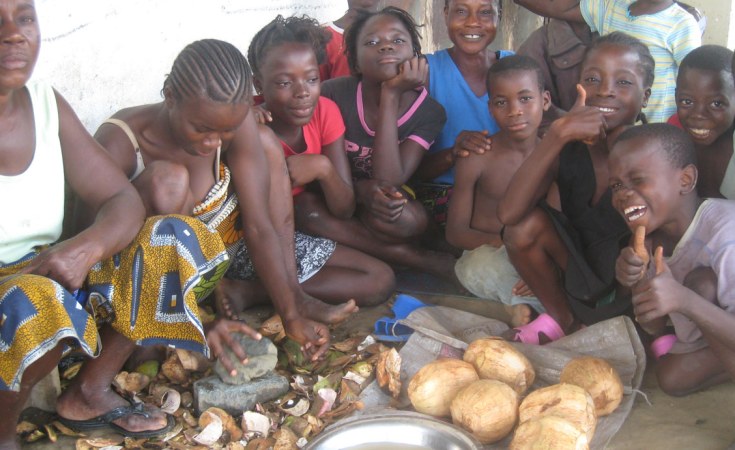Browerville — "The cassava we are eating today is from that small garden you see over there," said Hayford Quaye, a 50-year-old father of four. His cassava garden was planted just behind a large makeshift house in Browerville, a community on the outskirts of Liberia's capital, Monrovia. We spoke as 15 or more joyful looking children gathered around a teenage girl who dished out cooked cassava from a large pot onto their plates.
Quaye left his home in the southeastern county of Maryland and settled in Monrovia during Liberia's civil war. He and his family live with another large group of people who were displaced by the fighting. "I am serious," he emphasized, seeing I was surprised at the number of people living with him. "We are about 100 persons living in this house." He said they were from different counties, squatting in the 10-bedroom unfinished building and could not go back home because life in their rural communities is difficult. "The road is not good and the hard time is too much in the bush," he said. I watched as the children had lunch. They seemed to like the cassava. It's usually boiled and a little pepper sauce added.
The garden around Quaye's house has a variety of crops, including cassava and potatoes. The women set basket traps in the nearby swamp to catch fish. "We get a lot of fish during the raining season," one of the teenage girls said. "That's what we cook."
Growing up here, I remember backyard gardens were common in many parts of Monrovia, especially the suburbs. There were plots of land with all sorts of crops, especially traditional vegetables such as bitter bulbs, onions and peppers. But people also planted rice, Liberia's staple. Potato greens that make a delicious local sauce were cut out of backyard gardens and almost never bought from markets. My brothers and I had one of these gardens.
Many persons had quite large farms further inland. Liberians were told to feed themselves and not depend on rice imported from mainly Asian countries. Even government officials and civil servants took time out to do some farming. We spent a few school breaks on the farms of relatives in northern Lofa County, planting and harvesting rice. The county used to be the country's breadbasket because of its large rainforest and great agriculture potential. But all the zest for cultivating the soil virtually disappeared with the outbreak of war in 1989 - even the backyard potato greens gardens that checkered many parts of urban Monrovia can no longer be seen.
"Now everything we plant in our garden is what feed us and send the children to school," Quaye said as he took me through his garden. The large plat is planted mainly with cassava, but it does not produce enough to feed Quaye's family and send the children to school. "We get 100 Liberian dollars (under U.S.$2) a day. We are really suffering here my son," Quaye said. He became emotional but the children were not bothered. Having had their lunch, they were cheerful throughout the tour of the garden, running around and eager to see pictures I was taking. "Don't break my cassava sticks oh. Y'all don't want to eat again," Quaye quipped as he held a child who had stumbled.
Quaye said he would like to plant more crops but there was no more space. He stressed that if they had a larger area and the right tools they could earn about 1,000 Liberian dollars (U.S.$14) a day. "But we can't plant anything in the swamp," he said.
Many persons displaced by the war who now live in Monrovia are engaged in agricultural activities to earn money because of high unemployment. But seemingly, cultivation has not reached its pre-war level. The new government is trying to revive the sector by encouraging Liberians "to go back to the soil."
President Ellen Johnson Sirleaf's urban gardening project at the heart of her Monrovia residence is seen by many as a symbolic gesture to encourage not just urban gardening, but large-scale agriculture.
At a recent news conference, the country's agriculture minister, Florence Chenoweth, disclosed that Liberia's budgetary allotment for agriculture still falls below an African Union requirement. But she said the government was making strides aimed at improving the sector.


